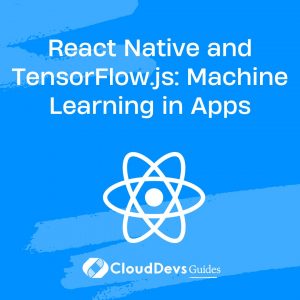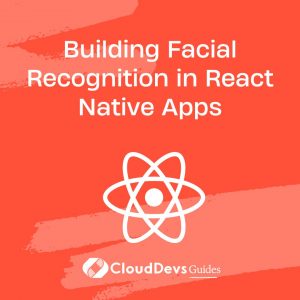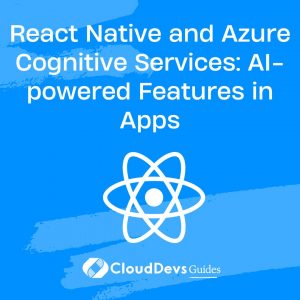React Native and TensorFlow.js: Machine Learning in Apps
In the dynamic landscape of mobile app development, integrating machine learning capabilities has become increasingly essential. React Native, a popular framework for building cross-platform mobile applications, offers a seamless avenue for incorporating machine learning functionalities. When coupled with TensorFlow.js, an open-source library for deploying machine learning models in JavaScript environments, developers can unlock a plethora of possibilities in their apps. Let’s delve into the realm of React Native and TensorFlow.js, exploring how they converge to empower mobile applications with machine learning prowess.
Introduction to React Native and TensorFlow.js
React Native, developed by Facebook, enables developers to build native-like mobile applications using JavaScript and React. Its ability to write code once and deploy across multiple platforms significantly reduces development time and costs. On the other hand, TensorFlow.js, an extension of TensorFlow, facilitates the execution of machine learning models directly in web browsers or Node.js environments. Leveraging JavaScript, TensorFlow.js empowers developers to incorporate machine learning functionalities seamlessly into web applications.
Integration of React Native and TensorFlow.js
Integrating TensorFlow.js into React Native projects is relatively straightforward, thanks to the compatibility of JavaScript-based libraries. Developers can leverage the react-native-tensorflow package or directly incorporate TensorFlow.js into their React Native projects. This integration opens the door to a wide array of machine learning capabilities, including image recognition, natural language processing, and predictive analytics, directly within mobile applications.
Examples of Machine Learning Applications in React Native
- Image Recognition: Imagine a fitness application that utilizes machine learning to analyze user-uploaded images of food and provide nutritional information. By integrating TensorFlow.js models into a React Native app, developers can create a feature that identifies various food items and estimates their calorie content, fostering healthier dietary choices.
Example: TensorFlow.js Image Classification - Gesture Recognition: A gaming application built with React Native can incorporate machine learning models trained to recognize hand gestures for enhanced user interaction. By integrating TensorFlow.js, developers can enable features such as gesture-based controls or character animations, augmenting the gaming experience with intuitive interactions.
Example: TensorFlow.js Handpose - Text Analysis: A productivity app designed with React Native can leverage TensorFlow.js for sentiment analysis of user-generated text, providing insights into emotional trends or feedback sentiment. By analyzing text inputs in real-time, the application can offer personalized recommendations or identify areas for improvement based on user sentiments.
Example: TensorFlow.js Sentiment Analysis
Benefits of Using React Native and TensorFlow.js Together
- Cross-Platform Compatibility: By combining React Native and TensorFlow.js, developers can create machine learning-powered features that seamlessly function across both iOS and Android platforms, reaching a broader audience with consistent user experiences.
- Performance Optimization: TensorFlow.js employs WebGL acceleration for GPU-based computation, ensuring efficient execution of machine learning models within React Native applications. This optimization enhances app performance and responsiveness, even when processing complex machine learning tasks.
- Faster Development Cycles: With React Native’s hot reloading and TensorFlow.js’s JavaScript-based APIs, developers can iterate rapidly during the development process, enabling quicker experimentation and refinement of machine learning features within mobile apps.
Conclusion
The convergence of React Native and TensorFlow.js heralds a new era of innovation in mobile app development, where machine learning capabilities seamlessly integrate into cross-platform applications. By harnessing the power of these technologies, developers can create immersive and intelligent experiences that cater to the evolving needs of users. Whether it’s image recognition, gesture control, or sentiment analysis, the synergy between React Native and TensorFlow.js empowers developers to push the boundaries of what’s possible in mobile app development.
Incorporating machine learning into mobile applications opens up a realm of possibilities, transforming mundane tasks into intelligent interactions and experiences. As the field of machine learning continues to evolve, React Native and TensorFlow.js stand at the forefront, enabling developers to craft innovative solutions that redefine the mobile app landscape.
Explore more about TensorFlow.js: TensorFlow.js Official Documentation
Discover React Native: React Native Official Website
Join the React Native community: React Native GitHub Repository
Table of Contents









